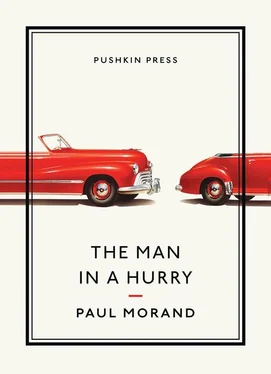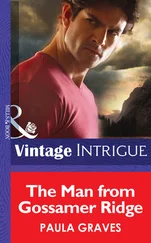“And then… and then there was my wedding night.”
Pierre paused: he had smoked so much, and the tobacco was so hot that his tongue was burning. He searched in vain for a carafe of water; it irritated him to have to get up and see that lonely shadow on the white wall: he drank water that tasted like burnt rubber straight from his hot-water bottle. The bad memory came back to plague him: he recalled his failed evening a fortnight ago, the absurd Alavoine play, the hurried return home before the end of the last act, the sudden, premeditated and certainly clumsy way he had dived into Hedwige’s bed.
“Hedwige resisted me, why? To begin with, she was willing, no doubt about that; she wanted and was eager to know me. And I, I… well, I hesitated for ages. I was in awe of her; through her nakedness, I could see her fully dressed, proud, demure and beautiful, too beautiful.
“So I feared the worst and plunged into the water so as not to be left on the shore for good. She tensed up violently, recalcitrant, stubborn, frigid.”
He tossed and turned. Even normally, lying in a horizontal position infuriated and exhausted him; he only felt at ease when he was standing up; as soon as he lay down, unlike all other men, he could feel the weight of his body, his head heavier than a paving stone, his back sinking into the blanket, his pelvis and even his heels which hurt when they came into contact with the mattress. And he longed for the morning, to be getting up, to be upright, for the earth to be like a springboard on which he would at last regain the lightness that was his strength. He had chosen a bed that was so wide in order that he could do the scissors, possibly a cartwheel, and even pretend to himself that he was running, that he was swimming; but at the slightest nightmare he once again felt trapped in his sheets and dreamt that he was being thrown into some dark Bosphorus, sewn into a sack and powerless.
Through tossing and turning in his bed, Pierre has allowed the cold, satin bedspread to slip onto the floor; he is lying on frozen peaks, his sheets eventually fall off too, goodness knows where.
“I plunged into her as if she were some difficult obstacle, something forbidden that infuriated me; something that contradicted everything that I had originally loved and found passionate and sensitive about her. I can see her that evening in her bed, clad in white as though in mourning…
“I was insistent, I was aware of my clumsiness, but my overexcitement got the better of me. This Lucretia-like resistance infuriated me. I behaved like a hustling bully. I rushed things at the end… and what did I achieve? Total disharmony.”
And Pierre could still see his solitary, hasty self lying beside this tight-lipped woman looking as beautiful as she would in death.
“And there I was thinking I could create a work of art with my own hands: a fine outcome!”
Pierre fell back heavily on his pillow.
“Yet God is my witness that in all of this I acted sincerely and in good faith! I thought only of her! I should have been like all men and thought only of myself; you can’t save other people without saving yourself first. Sincere in my embarrassment, in my determination to act slowly, in my zealousness to keep still… then suddenly shooting off in one direction and behaving with a brutality that was unacceptable, I must certainly have struck her as loathsome, distorted and ridiculous.
“Conclusion: here I am this evening, victorious, holding my ground, but holding it alone.”
PIERRE WOKE UP in the morning feeling refreshed, rested and calmer; he felt ashamed of his nocturnal alarms. Would he not have done better just to have accepted Fromentine’s simple explanation: Hedwige was tired and it was past the time to return home, that was all…
But what had she done yesterday that was so exhausting? At eight o’clock in the morning they had gone skating at Molitor; at half past nine they had gulped down a hot chocolate at Prévost’s; at ten o’clock they had chosen fabrics for a coat (Pierre, let loose among the samples, went straight to the prettiest material, depriving himself of the pleasure of making up his mind); at half past ten they went to buy some American corned beef from a charcuterie at Les Halles; from there he had taken her to the Doucet Library where he needed to make a sketch (very quickly, without even getting down from the librarian’s ladder), then to the Cernuschi Museum; after that, she had waited for him in the car while he negotiated a deal with Gulbenkian; since the time for lunch was well past, they made do with a few sandwiches soaked in beer in a bar on the Champs-Elysées. At three o’clock, while he took part in the committee meeting of the Musées Nationaux, he had sent Hedwige to try on her dresses, with instructions to collect him at four o’clock at the printers of an art magazine he owned and to drop him at the Arts of Benin exhibition in the avenue Matignon, from where she had driven back to Saint-Germain. Well? What was so tiring about that? An absolutely normal day. But her indolent sisters must have persuaded her that she needed to rest.
Pierre stretched exultantly. How good it was in the morning, ideas had clarity, things were back in their proper place, seen in their true proportions and in their natural colours; in the morning they had the transparency of crystal whereas in the evening the sun had stained them yellow like a bad Venetian painter, and at night it was the fakes that proliferated! Pierre had rediscovered sanity and reason and clear common sense, those “very French” virtues.
But nothing is so blinding as complete clarity; mirages are a diurnal phenomenon. It’s during the dark hours of insomnia, the hours of pessimism par excellence, that the heart probes deepest and attains the truth.
*
Nine o’clock and Hedwige is not there.
When you arrange a time with a woman, you do so without believing she will keep it, it’s inclined to be a time you arrange with yourself: you tell yourself that it’s only after that time that you will have to suffer. That is the consolatory virtue of the rendezvous, the rendezvous at which they do not turn up.
Half past nine. Pierre is still waiting and time is flowing by. People talk of time flowing by as though it were tumbling from a spring and as though this spring were situated somewhere uphill. When Pierre looks up, it is as if he were searching for the fountain that marks the beginning of this great stream.
“It must be a salt-water source,” he sighs, “heavy with all the tears of those who have waited.”
At ten o’clock, Pierre was due to meet the director of the Bremen Museum of Ethnography. He rings the Hôtel Bradford to cancel the meeting. Then, since his morning has been wasted and the weather is fine, and because he is very much on edge, not having slept, and because he needs to keep himself busy, he climbs up to the terrace to do a little gardening, for it’s the right moment, one needs to be ready for the arrival of spring.
It is not the right moment, mid-February is too early.
“February or March, aren’t they more or less the same?”
No, the great frosts are the worry; they’re even obligatory. But the weather is as it is in April, it’s so still this morning. All of a sudden the west wind, while staying loyal to its traditions of warmth, no longer carries its cargo of large Atlantic clouds — there has been an inexplicable delay in the arrival of the tide — and it has left the sky completely blue, completely empty, like its colleague the east wind, but without the cold.
Pierre climbs up the spiral staircase and reaches the terrace. He is very proud of his garden, which measures barely ten by thirty metres and which only has three sides, being enclosed on the fourth by a wall from which three of the building’s chimneys protrude, quickly transforming any visitors into chimney sweeps. In the middle of the three trimmed box hedges that protect the little garden there are small ovals through which you can see Paris, her distinctive monuments, her layers of variously coloured smoke with, in the centre, the basilica of Montmartre ready to ring out like the President’s bell, before he takes the floor.
Читать дальше












